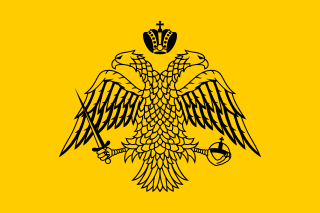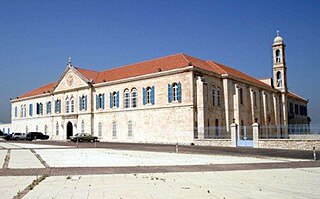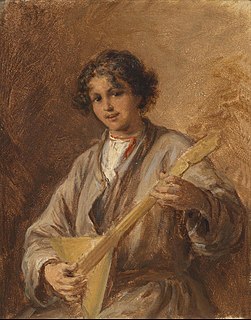
The Eastern Orthodox Church, officially the Orthodox Catholic Church, is the second-largest Christian church, with approximately 220 million baptised members. It operates as a communion of autocephalous churches, each governed by its bishops in local synods. Roughly half of Eastern Orthodox Christians live in Russia. The church has no central doctrinal or governmental authority analogous to the bishop of Rome, but the Ecumenical Patriarch of Constantinople is recognised by all as primus inter pares of the bishops. As one of the oldest surviving religious institutions in the world, the Eastern Orthodox Church has played a prominent role in the history and culture of Eastern and Southeastern Europe, the Caucasus, and the Near East.

Eastern Christianity comprises Christian traditions and church families that originally developed during classical and late antiquity in the Middle East, Africa, Eastern Europe, Asia Minor, the Malabar coast of southern India, and parts of the Far East. The term does not describe a single communion or religious denomination. Major Eastern Christian bodies include the Eastern Orthodox Church, the Oriental Orthodox Churches, the Eastern Catholic Churches, Protestant Eastern Christian churches who are Protestant in theology but Eastern Christian in cultural practice, and the denominations descended from the historic Church of the East. The various Eastern churches do not normally refer to themselves as "Eastern", with the exception of the Assyrian Church of the East and the Ancient Church of the East.

Divine Liturgy or Holy Liturgy is the Eucharistic service of the Byzantine Rite, developed from the Antiochene Rite of Christian liturgy which is that of the Ecumenical Patriarchate of Constantinople. As such, it is used in the Eastern Orthodox, the Byzantine Catholic Churches, and the Ukrainian Lutheran Church. Although the same term is sometimes applied in English to the Eucharistic service of Armenian Christians, both of the Armenian Apostolic Church and of the Armenian Catholic Church, they use in their own language a term meaning "holy offering" or "holy sacrifice". Other churches also treat "Divine Liturgy" simply as one of many names that can be used, but it is not their normal term.

The name Greek Orthodox Church, or Greek Orthodoxy, is a term referring to the body of several Churches within the larger communion of Eastern Orthodox Christianity, whose liturgy is or was traditionally conducted in Koine Greek, the original language of the Septuagint and the New Testament. Its history, traditions, and theology are rooted in the early Church Fathers and the culture of the Byzantine Empire. Greek Orthodox Christianity has also traditionally placed strong emphasis on and awarded high prestige to traditions of Eastern Orthodox monasticism and asceticism, with origins in Early Christianity in the Near East and in Byzantine Anatolia.

The Greek Orthodox Church of Antioch, also known as the Antiochian Orthodox Church and legally as the Greek Orthodox Patriarchate of Antioch and All the East, is an autocephalous Greek Orthodox Church within the wider communion of Eastern Orthodox Christianity. Headed by the Greek Orthodox Patriarch of Antioch, it considers itself the successor to the Christian community founded in Antioch by the Apostles Peter and Paul.

Kassia or Kassiani was a Byzantine abbess, poet, composer, and hymnographer. She is one of the first medieval composers whose scores are both extant and able to be interpreted by modern scholars and musicians. Approximately fifty of her hymns are extant and twenty-three are included in Orthodox Church liturgical books. The exact number is difficult to assess, as many hymns are ascribed to different authors in different manuscripts and are often identified as anonymous.

The Maronite Church is an Eastern Catholic sui iuris particular church in full communion with the pope and the worldwide Catholic Church, with self-governance under the Code of Canons of the Eastern Churches. It is headed by Patriarch Bechara Boutros al-Rahi since 2011, seated in Bkerke northeast of Beirut, Lebanon. Officially known as the Syriac Maronite Church of Antioch, it is part of Syriac Christianity by liturgy and heritage.

The kontakion is a form of hymn performed in the Orthodox and the Eastern Catholic liturgical traditions. The kontakion originated in the Byzantine Empire around the sixth century CE. It is divided into strophes and begins with a prologue. The kontakion usually has a biblical theme, and often features dialogue between biblical characters. By far the most important writer of kontakia is Romanos the Melodist. The only kontakion that is regularly celebrated in full length today is the Akathist to the Theotokos.

Latin liturgical rites, or Western liturgical rites, are Catholic rites of public worship employed by the Latin Church, the largest particular church sui iuris of the Catholic Church, that originated in Europe where the Latin language once dominated. Its language is now known as Ecclesiastical Latin. The most used rite is the Roman Rite.

Christianity in Lebanon has a long and continuous history. Biblical Scriptures purport that Peter and Paul evangelized the Phoenicians, whom they affiliated to the ancient patriarchate of Antioch. The spread of Christianity in Lebanon was very slow where paganism persisted especially in the mountaintop strongholds of Mount Lebanon. A 2015 study estimates some 2,500 Lebanese Christians have Muslim ancestry, whereas the majority of Lebanese Christians are direct descendants of the original early Christians.
In Christianity, the cantor or the worship leader, sometimes called the precentor or the protopsaltes, is the chief singer, and usually instructor, employed at a church, with responsibilities for the choir and the preparation of the Mass or worship service.

The Greek Orthodox Patriarchate of Alexandria and all Africa, also known as the Greek Orthodox Church of Alexandria, is an autocephalous patriarchate that is part of the Eastern Orthodox Church. Its seat is in Alexandria and it has canonical responsibility for the entire African continent.

Typikon is a liturgical book which contains instructions about the order of the Byzantine Rite office and variable hymns of the Divine Liturgy.

Western Rite Orthodoxy, Western Orthodoxy, or Orthodox Western Rite are terms used to describe congregations that are within the autocephalous churches of the Orthodox Christian Church and independent Orthodoxy. These congregations have used western liturgical forms such as the Sarum Rite, the Mozarabic Rite, and Gallican Rite. Some congregations use what has become known simply as the English Liturgy, which is derived from the Anglican Book of Common Prayer, albeit with some modification to the text to emphasize Orthodox theological teaching. The Western Rite that exists today has been heavily influenced by the life and work of Julian Joseph Overbeck.

The St Sergius Orthodox Theological Institute in Paris, France, is a private school of higher education in Orthodox theology, founded in 1925 in conformity with French legislation and the norms of European university education, accredited by the Académie de Paris. The mission of the St. Sergius Institute is to form educated priests and laypeople, intending to serve actively the Orthodox Church and representing it in the ecumenical dialogue, as well as in the religious and cultural life of their own country. It is under the canonical jurisdiction of the Archdiocese of Russian Orthodox churches in Western Europe, under the omophorion of the Russian Orthodox Church.

Memory Eternal is an exclamation, an encomium like the polychronion, used at the end of an Eastern Orthodox funeral or memorial service. The same exclamation is used by those Eastern Catholic Churches which follow the Byzantine Rite. It is the liturgical counterpart to the Western Rite prayer "Eternal Rest". The "eternal memory" mentioned in the prayer refers to remembrance by God, rather than by the living, and is another way of praying that the soul has entered heaven and enjoys eternal life.

Russian Liturgical Music is the musical tradition of the Russian Orthodox Church. This tradition began with the importation of the Byzantine Empire's religious music when the Kievan Rus' converted to Orthodoxy in 988.
The Choir of the Orthodox Church of Beirut was founded in 1992 by مارسيل خوري. The choir provide for the daily offices and celebrations of the Mass at the Greek Orthodox Archdiocese of Beirut.
Basil Gibran Kazan; May 16, 1915 – November 11, 2001) was a composer of sacred music in the Antiochian Orthodox Christian Archdiocese of North America, and author of the multi-volume Byzantine Project from 1967 to his death in 2001.













